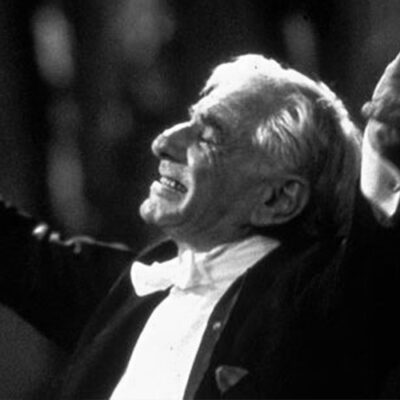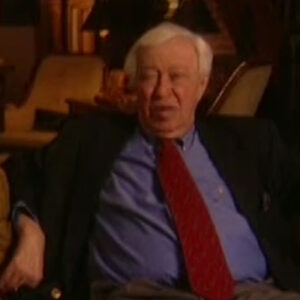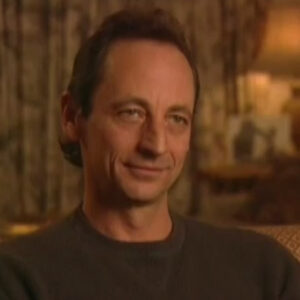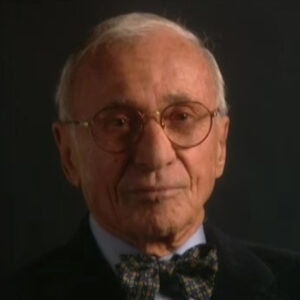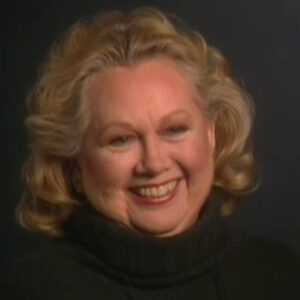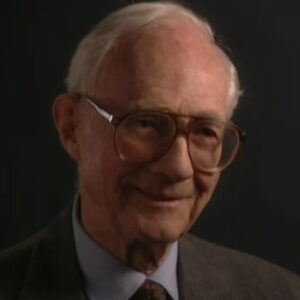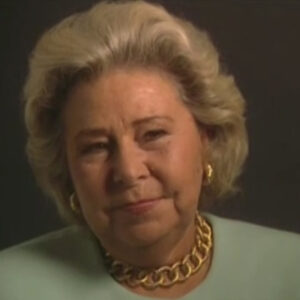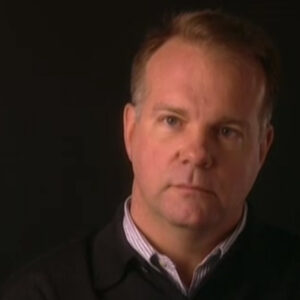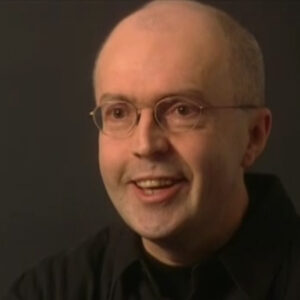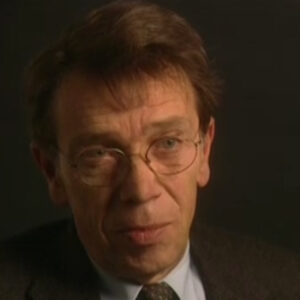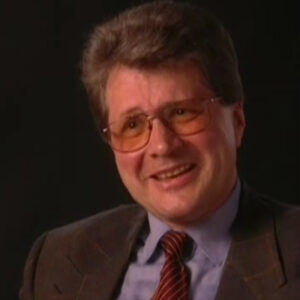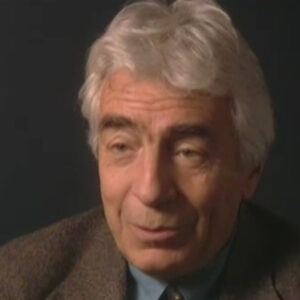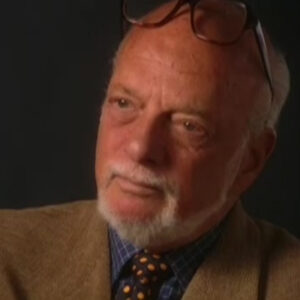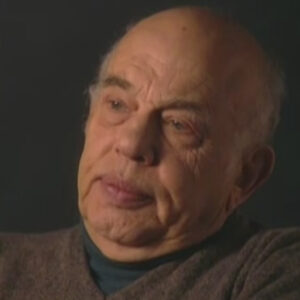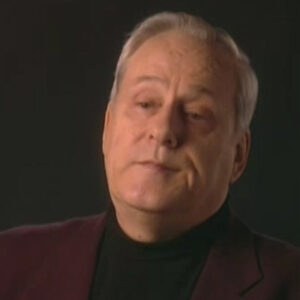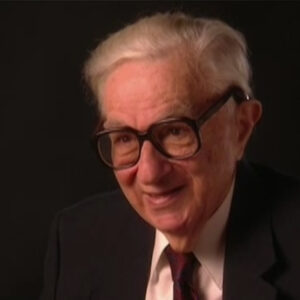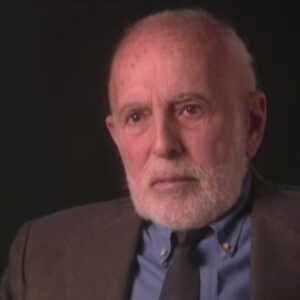Speaker Well, my first contact with Larry was from the audience, I was, my God, I was in the Army and I was stationed in San Francisco, and he came through on the tour that he did with the Israel Philharmonic.
Speaker And I had never seen him or heard him except on a few records.
Speaker And that was a long time ago. I’m talking about in 1951, something like that. And I went to hear a concert that he did in San Francisco, and I was absolutely blown away by it. I thought that’s the key to the absolute it’s the answer to everything. So the next night I went over to Sausalito and the next night I went to Berkeley. And I mean, I followed him around like, you know, like a groupie. And I never met him. And then when I did meet him in San Francisco, he was very, very nice to me. And then we talked about how he wanted me to give piano to him, his regards. And I said, I don’t know, piano and typically language, which I didn’t know at the time. He said, how is that possible? I mean, you’re stationed in San Francisco. Why don’t you know piano? I said, Lenny, I just don’t. And he then made it possible for me to meet him, which is something I was always grateful for because I turned out to be maltose pupal and. But, you know, even then, when he was very young, he just took it for granted, everybody knew everybody if they ought to know one another. And after that, I was in fairly close contact with Lenny for most of my adult life. I mean, I remember when did he read Age of Anxiety in there? Was it in the early 50s, middle 50s, something like 40? OK, well, in that case, in that case, that’s probably the reason that we talked about it, because Luca’s father had done the premiere in New York and I did the second performance as a pianist in in Los Angeles. And he must have talked to me about that. That’s probably how we actually had a reason for meeting even in San Francisco.
Speaker So he knew that you were a musician? Oh, yes. Did you play piano?
Speaker Not like you go and play for someone you know. But it was it’s you know, you get to musicians in the same room as hard to avoid. Somebody goes to the piano. And at that time, I didn’t know that if Lenny’s in the room, you don’t go to the piano, but.
Speaker Yeah, so he certainly was aware of it, did he ever did he ask you to do the age of anxiety?
Speaker Yes, and it was in Los Angeles and I played at the. Yeah, and it’s a long time ago, you know, I mean, details on who asked who where, I haven’t the faintest idea anymore.
Speaker I was just trying to because he was very particular about who performed, you know. So, um, you know. But you looking good.
Speaker Yeah. Well, I was you know, he he played it very, very well. And of course, Lucas played it very, very well. And, um, and then later on as a conductor, I conducted it in in England and for the first English performance. And I don’t remember who was playing the piano, but it was somebody who was alien to the to the character of the piece and it didn’t quite work.
Speaker What do you think of the age of anxiety? What do you think of of those where they since you played they cards, played other pieces of bodies and conduct of you? Are you ready for that?
Speaker Yes, I’ve I can’t pretend that I’ve played as things a great deal.
Speaker But I mean, I’ve I’ve I’ve played Jeremiah and I have and I played it’s very exciting. I’ve conducted some of the shorter pieces and the.
Speaker In the song cycle, I accompanied, you know, so I know I’ve never done the piece that I think is his best piece and that’s the violin serenade, I think that’s a great piece. And I would have liked to have it’s not come up, you know, when I have certain soloists that don’t happen to play it or whatever. So it hasn’t come up. But that’s a great piece and it’s my anxiety. I liked it very much when after he changed the ending, the original ending. I know that he had a quite literary reason for doing it that way. But the satire was lost. You didn’t understand that. You just thought it was a big vulgar ending and he meant it to be, but on a different level. And then once he changed that and he realized that it’s difficult for a piece that is in essence a piano concerto to end with the pianist sitting in dead board silence for 10 minutes. It doesn’t work. So he changed that and then it was a lot better job of that.
Speaker Yes, that’s right. That’s right. Yes. We actually did a of that John Cage four years ago called I have nothing to say. And I’m saying, oh, he was so smart and it with five minutes of silence. Did it really. Oh, that’s a great that’s wonderful.
Speaker But, you know, John Cage was immensely smart and his some of his writings are absolutely wonderful. Yeah.
Speaker He knew what he was about. Yeah. Roger lives in a community that Jack Cage was one of the founders of the. How do you explain why these magnetism to the public, to the public?
Speaker Well, I mean, for all the surface reasons that that people become magnetic performers, I mean, he was very volatile, he was very outgoing, he was extremely good-Looking. He moved well, he he was dashing, you know, all over. He had a cape on, you know. I mean, that’s what you’re talking about, the public. But what the musicians went for was, of course, a whole different thing. He was. What he really was incomparably good at was being a pedagogue, and I don’t really mean when he stood behind a lectern and explained afternoon of a phone, I mean, probably in the way he said hello, he was always teaching you. And sometimes you didn’t want him to teach you, but he did anyway. And he was really brilliant at it. And he had a fund of knowledge that was insane. I don’t know whether you ever had to play like word games or trivia or something with him, because it was you know, I mean, I used to say, you look it up in the encyclopedia, I’m going to look it up in Lenni. I’d call him up. You know, he always knew everything. It was scary. The only thing was that if you said to him, what year was the Wright Brothers flight, he not only told you, but then for the next hour you heard about airplanes. But that’s OK, you know, and when he when he did like the Harvard lectures and things, they were really phenomenal. And they they had an insight that had nothing to do with being flamboyant and that had nothing to do with being such an extrovert, which he certainly was. But they were the the the end result of a great deal of knowledgeable and deep thinking about music. And it opened up a lot of windows for me.
Speaker Do you think that went landed because the election went over the heads of a lot of people and not everybody thought, I mean, some people have said that there’s less than meets the eye. What do you think was the essence of the northern elections?
Speaker I don’t think they were meant to dazzle the same audience that looks at Laverne and Shirley. You know, I don’t think it bothered him. I think he was out to prove that he was a really seriously schooled thinker and musician. It wasn’t just about music. And I think he proved that. I thought I mean, you can always find some momentary flaw in a logic if you examine it far enough. And I suppose you could, then I’d have to see them and reread them. But at the time, I thought they were pretty terrific.
Speaker Did you watch young people? Yes, of course. But you didn’t you weren’t you didn’t appear in the young people’s concerts. You made your debut and didn’t have money. Yeah, that’s right. Not part of we did not know. OK, describe what it was like to work with money as a conductor. You as a pianist. Yes.
Speaker Well, of course you must remember in those days I wasn’t conducting, you know, so there wasn’t that particular whatever you want to call attention or feeling between us. But as a pianist. He was very generous, I mean, he went your way. Unless he really disagreed very violently, I mean, I was in the audience at that famous time when he accompanied Glenn Gould and made that speech about, I don’t believe in this, but I’m going to do it anyway. And then he accompanied him as if he believed in every note. And that’s really what it was like. I didn’t play a great Soul-Searching piece with him. I played the first Shostakovich concerto, which is still around on record. That’s amazing. And he was absolutely wonderful. We didn’t we only had a half a session to make it, you know, and we made it somewhere in. Again, in New Jersey, I’m not sure where anymore, but he was wonderful to work with, very kind and patient, and yet he worked very quickly. So I have a funny memory of that because we finished it and we needed one retake of something in the last movement, which we did. And then he turned around, said, that’s great, that’s fine. I said, OK. And the booth said, yes, fine. And he said, All right, Hayden and gave a downbeat before I could get up off the stool. He was already recording of the symphony, you know. So in many ways, although in a more limited way, I also learned that when you were recording and when you’re working with an orchestra, don’t waste their time, keep going. And that’s something that I watched him do many times.
Speaker What do you think it was to see Lenny live?
Speaker Oh, very. Yes, I think it was very important because I think he was he was so extrovert, so flamboyant. And I don’t mean in the excessive gestures. You know, I remember very well that somebody in some revue or other said that he he he he conducts himself as if he were fighting off a swarm of bees. I always thought that was the most hilarious image, but. It didn’t matter. I mean, I never, never wanted to copy that part of his conducting, you know, I have worked on a long time ago that they don’t play louder when you jump. So I just thought I’d save myself the effort. But with him, it was never a calculated show off. I’m quite convinced that I don’t think he ever had the mental equation of if I do this, the audience will think that. I don’t think so. I think that he genuinely did what he did on the podium because the music evoked it in him. And I remember when he did a Mahler nine in Vienna and when he sank to his knees and the last few bars and and and people thought, oh, dear, oh dear, oh dear. But he really, really felt it. So then it’s OK. You know, I have no criticism about that.
Speaker Do you think it bothers people so much when a music is essentially an emotional experience for most people? Yeah, music. I think that’s the basis. So why why bother people so much that life is so emotional about?
Speaker I don’t think it bothered people. I think people adored it. I think some of his colleagues are bothered by what? Because almost nobody can do that, you know, and and be really sincere about it. You know, it’s it’s something that can be laid on with a purpose.
Speaker But, you know, in a way, it’s like.
Speaker Well, you’ve been very smart enough, as I was criticized for writing the way he did after everything else that happened after The Rite of Spring, although but he did it because he really believed it. Now, there are lots of people who imitate Romanos writing, and they are meretricious because you can hear that it’s an imitation. And I think that all the young guys who, you know, who sweat and weep and jump and leap and fall down, I think you meant at least I mentally said, don’t do that, you know, because I don’t believe it. But with Lenny, I did believe that I didn’t always love it, but I always believed it. And then he had a faculty of doing something that was really amazing. I remember once in in Tanglewood, I don’t know what the first half was of the program anymore, but I went through one of those things where I thought, no, I don’t I don’t want to see this. I don’t want to see this. This is so excessive. Not not visually, but also musically. It was pulled apart so wildly. And I knew he meant it and that it was sincere, but I didn’t want to be part of it. And I stayed after intermission because after all, you know, it’s the best show and it’s Lenny. And I thought I said and I heard a transcendentally beautiful Eroica. So he was within the same two hour span capable of being black, white, north, south, you know, amazing.
Speaker It’s very interesting.
Speaker This is something you can really speak to, and if you watched him over the years, people talked about, I’ve read a lot and a lot about how his temper became so much slower as you got older and sort of mine.
Speaker I know it’s definitely a big deal to a lot of people to criticize private concert recordings. Apparently, people feel it just impossible, you know, longer than anybody else’s.
Speaker Yeah, I guess what I’m really getting at is Lenny’s interpretations. Do you feel that in terms of his own experience, his maturing as a composer, as a conductor, how do you feel that affected his interpretations over the years?
Speaker I think his age affected the interpretations only if it were possible physically, but not not through a mental process because. It is true that toward the end of his life, when he did the last moment of the Cherkovski six or slow movement newworld or some of them, they really got so distended that it was very difficult to know what to do. But again, I’m sorry to repeat what I said before, that he didn’t calculate it. He didn’t say I am now going to get slower. It just happened and you either bought it or you didn’t, and I always was full of admiration for a sensibility such as his that was so sensitive to the music that was going on that he would react viscerally.
Speaker But had he done it on purpose, I would not have liked it.
Speaker No, no, because some of it just this all gets personal. And you and you have to talk to many conductors. It for me, it goes against the grain to to distort things that much. But for him it was second nature. And sometimes, like in certain of the Mahler symphonies, it’s absolutely irresistible because I’m sure that he thought he’d written them. I’m absolutely sure there’s another piece and three, I’m sure he thought he wrote it because nobody can look into those pieces from the outside and get that much out, you know, and.
Speaker I can’t believe that Marla would have disliked it now.
Speaker You know, I think I mean, did you I mean, he talked about how he felt that because he was a composer. Yeah. And did, in fact, respond to the music maybe differently or see something in it or do whatever he called it. Re composing that when, you know, as the conductor, he was composing music when he really did something, told this incredible story about how he was doing Beethoven once.
Speaker And he said he actually felt Napoleon’s soldiers in the back of the room, you know, whatever.
Speaker But he was in, I guess, in Vienna who said that? The critics told us, told me this story, whether it actually made me feel when you saw them know.
Speaker Yes, he was. So I’m going to take the fifth on that. I find that a disgusting statement. Yes, I really do.
Speaker Why? Because it’s not true. It’s showing off. That’s not true. It is disingenuous, disingenuous. Yeah, yeah.
Speaker But no, he he he did do some startling things, you know, I mean, certain pieces that are kind of license to kill. You know, when he did Lovell’s or Rimsky, a series of things would go on where you would say, oh, don’t you know? But. It he again, it was absolutely second nature, I don’t think he ever did it in order to achieve an effect. I think it’s just the way it happened. As far as Recomposed is concerned, I think if you’re a composer, you do tend to look at pieces slightly differently, but usually in the way of structure and where the thing is going and where the weak spots are and you know, where it does become just color, et cetera. Because one of the really amazing conductors was Benjamin Britten. And even when he did pieces that were far removed from what he did, you know, when he did hide and creation, I think it was just it was just amazing. Elgar Rentiers was extraordinary and completely different from anyone else. He did a Mozart 40 once, which was so slow and so long, he did every repeat and. You had to be aware that there was a great composer doing that, so it wasn’t willful and it was made it made it fascinating. I love those performances.
Speaker It’s interesting. How do you think Lenny rated himself as a composer?
Speaker Oh, I think he created himself highly. He should have. You know, he certainly he wrote a lot of pieces which. Which were. Facile, you know, no, wait a minute, I’m going to take that back, because that was a word he hated and he was right to hate it, because what it implies is that it was easy to write. Nothing’s easy to write. No. If somebody is as good a musician, as profound a musician as Lenny and he writes, not a C major scale, it’s not facile. Takes him a while to write it down. What I meant was that lighthearted, you know, and some of those pieces I don’t really care for. I mean, he wrote a song cyclical I hate music, which I think is fair to the point of screaming, you know, but then he would turn around and write other things which are really so deeply felt and so beautiful that he had every right to think of himself as a very good composer during his lifetime. He wasn’t accorded very much.
Speaker Generosity from the critics as a composer, but they’re making up for it now.
Speaker What do you know? He was incredibly young when he wrote I was like 24 years old. You do know that that was that was that was being when he did the substitute a volunteer in 1943 when Romney got sick. You know, he had just done the I hate you.
Speaker I didn’t know that. I didn’t know the caliber of that at all. So 1943. That’s very early. Yeah. But I don’t know if you like it.
Speaker And I don’t particularly love song effects, but but I do like quite a bit of his music. I think there’s more good music there than most people have heard.
Speaker Oh yes. I think that Jeremiah is wonderful. And as I said, the violence and it is very beautiful. And I the one of the big pieces, the one that I don’t like is mass. Because I think that’s some of that is slightly posing, I think, and it was.
Speaker Look how hip I still am, and I don’t think he had to prove that when you think of when you look at a whole Atlantes compositional output. Do you see a through line as a composer?
Speaker I don’t think I know his pieces intimately enough to have the temerity to say anything about it. No, I like certain pieces. I don’t like certain pieces. But I think that when a conductor composes. Steadily, whether it’s good, bad or indifferent, is another subject, but when he spends most of his adult life composing, I think it helps him as a conductor.
Speaker How do you feel about that? I mean, what do you think that that Leonie’s life, the conflict between being a composer being conducted and how he’s not that any of us who is a position to judge anyone can live just like this?
Speaker Do you think there was a conflict in his own mind about being either a conductor or a composer? Absolutely. Really? I thought that he took both.
Speaker For granted, insofar as he knew he was going to continue to do both, I mean, he wasn’t about to say, well, you don’t want me to do one or the other, so I’ll stop and.
Speaker So I don’t think it was a real choice for it. No, but he had conflict.
Speaker Huge conflict in before I can give you a coherent answer and I have to know what you mean by that.
Speaker Well, I mean, I think that he constantly felt that he should be taking more time off to compose.
Speaker He created a very difficult I mean, maybe some people are able to do this, but the he was not able to right on schedule, as people will say, you know, now I’m taking a six month sabbatical and I’m going to compose every piece of the case against what kind of scientific questions.
Speaker Only when he did take the time to compose, the expectations were so great, his own expectations all around from others in his own that he was almost paralyzed by and procrastinating.
Speaker And then six months would be over again, anything to get enormously depressed and go bad for two months.
Speaker I mean, you know, I’m sorry, but it’s terrible. Boy, can I sympathize, you know what I mean? This is a cycle that happened over and over and over. Oh, well, that’s interesting because I.
Speaker I mean, in my own lesser way, if you like, I have a problem about when do I take time off from the conducting to compose. And I just wrote an opera that was difficult for me because I kept conducting and all that. But I also have to make plans and I’m going to take X months off during which I write something. The only thing is that because I grew up in an atmosphere of commercial music, making deadlines to me are so sacrosanct that if I’m not given one, I will make one up. And I gave myself deadlines on the opera. This is how when I’m finished with the piano score, this is when I’m through with the vocal chords, when I’m through with with orchestrating and I met them, but that’s because of my peculiar past. And as far as expectations are concerned, I can only tell you again, it’s a personal reminiscence. But a great friend of mine is Tom Stoppard. And we’ve worked together and we like each other and all that. And he asked me a couple of months ago, how’s the opera going?
Speaker And I said, well, you know, Tom, on Mondays, Wednesdays and Fridays, I think it’s pretty terrific. And on Tuesdays, Thursdays and Saturdays, I know it’s rubbish, you know? And he said, well, maybe you’re wrong on both counts. Maybe it’s always mediocre.
Speaker And I said, you I need yes. I think I hung up on him. I’ll be the best playwright today. You may also need more discipline, money.
Speaker He’s not particularly disciplined person in any way, shape or form. No, he had an excess of habits.
Speaker Yeah, I think that. I mean, do you think that that got and what was the general feeling in the music community about Lenny’s lifestyle and how that might affect you?
Speaker I’m only talking about the fact that he used to drink quite a bit and smoke incessantly right through coughing fits and all that. And there wasn’t anyone I mean, we overlapped a lot, for instance, with the Vienna Philharmonic. And whenever he had just left, people would tell me stories of real horror and and regret and sympathy for the fact that he looked bad and he coughed and he and he seemed to need more drink and more smoke and all that. And everybody was so sorry because they thought that he was wasting certain energies that could be better put to use, you know, somewhere else. And I, I did I remember once I went backstage and he was grey in the face and had an unbelievable coughing fit during which one of his supposed helpers handed him a lit cigarette.
Speaker So I don’t know how badly do you want to keep your job?
Speaker I mean, having control over that, how do you think he felt about his Broadway image, do you think that he began to by the press that you’ve worked for Broadway series?
Speaker No, no, I can’t go for that. You know, and I mean, besides words, with the exception of. Juan.
Speaker All his shows were roaring successes, you know, which, to be blunt about, is very hard to regret having written a hit. You know, so and they are really very good, you know. That is a wonderful piece and so is on the town and wonderful town. You know, I think that certain of his pieces are being accorded a kind of awe now, which he would find just as ludicrous, you know, but. The only one of his shows that didn’t work was sixteen hundred Pennsylvania Avenue, and he’s he rescued some of that into other pieces that we’re well placed now.
Speaker Yeah, but actually, they’re coming out of concentration, right?
Speaker Yes, I know. Yeah. Yeah. Kent Nagano did it. I actually heard. Yes, Norvan.
Speaker And if you didn’t actually see the show. I did. You there’s no way I have heard this music.
Speaker So I’m actually I’m. Was it really bad?
Speaker And they said, well, the music was alright, but the show was unspeakable. I mean, the show at ten minutes and you thought, this is Leonard Bernstein and Alan Gaoler. And it’s not possible. It’s not possible.
Speaker But.
Speaker And went on and on, but no, the music I was there once in his living room when he played some of the score before I saw it, and I thought the score was terrific, but it got drowned in in a kind of morass of moralizing. I thought it was awful.
Speaker Did you hear the question?
Speaker Did you ever hear any of the sketches for work that was never realized, but that he did a lot of work on myself? No exception?
Speaker No, I was not that close of friend. He would not have done that. No, no. You have to talk to people like Hoffman and Green and all that. But he never played those for me.
Speaker You were, I understand, there when he was or when that when the recording what was done in Hollywood? Yeah. Can you tell me about that?
Speaker Well, I can tell you about it that he didn’t conducted, which I thought now, especially in retrospect, it was conducted by the man. It was the head of the music department at Columbia Studios, Morris Tarloff. Very nice working day guy. Very pleasant man. But why Lenny didn’t conduct that. I’ve never had to explain to me, I never asked, really, but I mean, it’s it’s inexplicable because the performance on the soundtrack is not terribly good. And I think it was musically and rhythmically beyond what the orchestra was used to. And they could have coped with it infinitely more easily had Lennon conducted. But I don’t know. I remember sitting in the recording stage with him and every once in a while I could see him, you know, react kind of sharply. But he didn’t do anything about it. And I like that score very much. That was a good score. And he didn’t talk with you about writing for the reason?
Speaker I don’t know. No, I think he enjoyed the process. You know, and I do know that he was nominated for the Academy Award that year. And the Academy Award means very little, actually, but never. Never mind. It’s fun to get it and. He was nominated and what won that, it was Dimitri Tiomkin for The High and the mighty John Wayne movie. And I must say, there wasn’t a musician in Hollywood that didn’t cringe at that, you know.
Speaker It’s interesting, I think I forgot that he was nominated for. Yeah, because he was the only one nominated for an Oscar for best. Yes. Well, that’s another thing that’s I mean, that’s hilarious. But that’s just the system. Terrible system. You should do something about that. Something incredibly unfair about that.
Speaker Well, George Bernard Shaw, I was the only one who didn’t win for my fair lady.
Speaker And same thing.
Speaker Did you conduct relentless appearance? No, no, I conducted concerts when he was in the audience, but I never know, never when he was a pianist.
Speaker People have talked a lot about Lenny democratizing the role of the conductor. On demand, the kind of a conductor in terms of with the orchestra and in society, you know, because he became sort of in some sense, it was first of all, played by the very construction when he died, construction workers on the street waving at his first hand.
Speaker Look, apparently, you know, really? Oh, my goodness. That’s very touching. I didn’t know that, but. So this has to have a lot of thoughts about I mean, what would it be fair to say that Lenny was the first?
Speaker Really famous American conductor Lenny was the greatest influence on American conducting. And on the view of the American conductor of anyone in history, I mean, it doesn’t make any difference whether you adore them or despise them or whether you admire them or decry them. There’s no, again, saying that he was the biggest influence that ever happened in American music as far as conductor is concerned. Can you elaborate? Well, it’s just because. For a long time, people equated, I’m talking about general public now, conductor equals Toscanini, you know, and. When it became conductor equals Brownstein, it was very obvious that he was American and that he was very pleased with that and that he thought this was a better country musically than anybody anywhere else, even including his adoration of Mahler and all that. He always thought that American music and American music teaching and the American pool of available talent and all that was the greatest in the world, which of course it is. And he was public about that. And so after a while, he was the the it’s what everybody thought of when they thought of a conductor in this country, the thought of an advance. And it it helped everyone in his own and his and the generations after him. What’s what’s missing that I haven’t said?
Speaker Could you talk a little bit about what how he helped or discovered or helped or put on track of American conduct when he first started conducting programs?
Speaker Yes, the assistant conducting program, certainly. And many people came out of that, such as our Claudio Abbado, you know, lots and lots of people, but.
Speaker Also, I mean, he.
Speaker He made it possible on a very prosaic level, if you like, for someone born in America with a very American name to say, yes, I’m a conductor, not change it to some extremely fancy Romanian name that he might have come up with because all of a sudden it was OK to be an American conductor. And that was something that nobody had beaten that rap before, you know, and. So everybody was grateful to him for that, and of course, then he did champion a lot of remarkable American music, not that they hadn’t been played, but, you know, people like Copeland and Bill Schumann and if he played everybody and he played them in the context of programs, which also would have a Beethoven symphony of Brahms Symphony, Mahler Symphony. So it he did he did an awful lot of good for American music.
Speaker What would you say? And I’m not looking for the answer. I think that he had to in the end, say what I think his greatest legacy is what I read years from now when we look back at the 20th century American music, what where will I be?
Speaker You know, I you know, I absolutely I cannot because I can’t, you know, that’s so dangerous, that kind of thing. Because, you know, in a previous century, you would have said, well, the opera composer would be most revered as Meyerbeer and, you know, and you would have been wrong. So I don’t like those looking back hundreds of years. I don’t know. All I know is that at the moment there isn’t anybody making music in America that doesn’t have a reason to be grateful to Lenny. And primarily because of this champion, a champion of Americans, yes, and because he was both from a practical point of view, a remarkable musician and a remarkable all around musician and a remarkable conductor, but also. Just from a from a practical point of view, he did so much, you know, and, uh, there’s no way not to be influenced by it, even if you don’t look anything like and make any gesture like in program the same things. We all came under the influence of Leonard Bernstein. He was larger than life is the point. He became an icon, you know, and not everybody likes all the icons, but he was certainly larger than life. And. You know, he was capable. I remember I went to see a play called Separate Tables, Terrence Rattigan, I love the play. That was terrific. And afterwards I walked out and there was Lenny and Lenny saw me and he came whipping over and said, oh, this play makes you believe in God. It’s so remote anywhere on it. And all of a sudden there’s like 100 people looking. And I thought, Lenny, please don’t do this. But, you know, everybody in the theater knew he was there and he didn’t do it for that reason. That’s the thing. That is when you didn’t know him. That’s very difficult to comprehend. And the people who are his most vehement detractors don’t believe that. They think that it was a series of convulsively flamboyant gestures, but he meant it at the moment. I mean, when he was such an interesting mixture of generosity, he wasn’t intelligent, I mean. Yeah. How did his relationship to other musicians change over the years? I don’t know. I don’t know. I didn’t know him well a long time ago, and I wasn’t close enough to him so that his relationship with me changed a lot. He was very good with the orchestral musicians, he did like that whole business about being Lenny, you know, and one of the boys and all that, but I was told by people that he could he turned suddenly very vicious. There’s that infamous thing of his recording with that story and with career as coming in for it. Good Lord. But. I was never on the receiving end of that, and I didn’t I didn’t really see it yet. Somebody said something quite. Perceptive. And that is that Lenny was the boy genius and he was the grand old man and he skipped middle age that you said, well, all right, yeah.
Speaker Yeah, I hate your dad.
Speaker No, that’s not I would not have said no that I wouldn’t have said boy genius to the ground because he was both. But nobody ever he didn’t go through that period in life where you just kind of settle down, you know. Interesting. You’re right. I work with these guys working up to that. How did you learn from. I learned a lot about programming he had he was very adventure’s about programming, and I always thought it was interesting that, for instance, when he was with the New York film, that he took a lot of beating about not doing enough new music. Well, all you have to do is take a look at the years he was there. There was an immense amount of new music and not always likeable new music and much of it commissioned by him and. He did not believe in in a contemporary music. Being put into a ghetto, you know, now we’re going to have three weeks of new music, he didn’t believe in that, nor do a great many people, me included, because either it’s good enough to play in anybody’s company or it isn’t. And so I very often when I was beginning my career, I would take a look at his programs and not necessarily copy them, but I knew what was possible to do. And also that if sometimes the program looked fairly gray on on the paper, it didn’t turn out to be. So I mean, I went I was at the Philharmonic when he had finished discussing kind of token leader and then followed with Cibeles for. Well, that’s not exactly Gayety Parisienne, you know, but it worked. And he made you think in directions of repertoire that were very interesting. And he also mixed he took chances. I mean, some of them work, some of them didn’t. I remember the need to Fidelio once with somebody telling the story or at the you know, like like a Greek chorus, I don’t know, some opera. Where you had somebody narrates in between Arias and it was weird, you know, that I could see where he thought that it might have been wonderful and it might have been wonderful, you know, so he took big gambles and I like that. I can’t remember. It’s awful of me not to remember, but there was an opera which was sung and and he had somebody tell the audience what was going on and and it turned out to be curiously. Patronizing and he didn’t mean it. I think she’s doing this right.
Speaker But it’s. Got worse, really? Oh, it wasn’t Oedipus Rex. Oh, wow. All right, do that have Alpers, but the ones they did do the exception of that was Rex.
Speaker He seems to have made a big splash each time you get this video in your house. Thank you. And was history making as well Falstaff?
Speaker Yeah, Rosenkavalier. Interesting, but I think I think you just hit it.
Speaker That was it. I think that’s all the need to cover.
Speaker And, uh. Yeah. No, no, no, no, no. Cavalleria he did much later on at the an argument.
Speaker Let me see. I didn’t know that didn’t I. Yes. He did have the captain.
Speaker He did. There was not a huge repertoire. No, not in terms of a routine Yabe opera conductor. I mean, somebody like Jimmy Lyon who can at 48 hours notice, do 50 operas, you know? I mean, I’m not making that up. That’s that’s a lifetime commitment, which Lenny didn’t know. But he liked theater, so he liked conducting opera. Do you think what’s not a lot. But, you know, for a conductor trying to figure out exactly what he is and why they can do more? Oh, it’s again, a completely pragmatic. It just takes so long. You know, you do a new production of an opera. You’re busy for six weeks with somebody like Lenny who’s got six weeks. You know, it’s difficult. And he wasn’t the kind of opera conductor where he was willing to jump in the next day for something because he wanted to have an imprint on the rehearsals. And if you do that, which means it is by necessity a new production, it takes too much out of your calendar. I mean, I was sorry to turn this around, but I was in Dresden with the state Scoppetta a couple of years ago and I came to the the auditorium one morning for rehearsal. And they were the staff. The management was standing outside and they said and I said, would you ever consider conducting the Strauss file on a certain. And I said. Yeah, sure, when and they said tomorrow and I said, no, you have to be and you have to be certifiable to say yes, but somebody did, you know, somebody who was had spent his life in the pit.
Speaker And for somebody like Lanny, that was not interesting, he did learn in two days, I’m sure, and it was first operating on that amazing story of Lenny at the piano.
Speaker How would you assess? I think that he started out being a wonderful cast and I think he could have been a terrific guy, but in practice, I mean, it’s that kind of simple. I like the way he played Mozart concertos very much. He liked to accompany certain singers, which he did with enormous inside, an enormous enthusiasm and a great many wrong notes, which is OK and. You know, he was very at home on a piano, and he could he could improvise and organize people to sing and all that, and he was wonderful at that and. He made a couple of early records of lots of conservatives that I liked very much indeed.
Speaker Should we start to talk about jazz?
Speaker Well, he he was very fond of jazz. And he in fact, he probably loved it, but he certainly couldn’t play it. No, no. He had he had a peculiar vision of what jazz playing was about. And it was kind of fraternity house, you know, but. You know, well-meaning and jolly, but had nothing to do with it, but he he loved it. And many people who are if you’re you know, if you if you’re an international conductor, the music director of the of the New York Philharmonic, you don’t have to love jazz. And he did. So that was a great plus. And it gave him an insight into an aspect of American music which can’t possibly be overlooked. So there, again, many places to him. I do wish privately that he hadn’t sat down and tried to join in. But that’s OK. That the jazz influence in his work. How would you musically describe it? Well, it’s the same as Copland. I asked Copland once how he came about all the jazz influence in his own music, and he said, well, you don’t grow up in a vacuum. And he said, when you when you grow up in America, it doesn’t make any difference whether you collect the records or go out to hear it. It’s in the air and you hear it and you feel it, use it. And that’s when he was very clever at it. So that in terms of I mean, he wrote multi rhythmic music for symphony orchestra, almost better than anybody. So there was a great deal of influence which he used brilliantly. Well, can you give me an example? Yeah, there were sensory dances which are fierce to conduct and even fiercer to play because there’s so many odd meters going on and everything has to be rehearsed separately and then put together meticulously. People think that it’s going to be a West Side Story medley and it isn’t anything of the sort. It’s really hard, but it’s wonderful music. Just because we’re laymen here and I know, can you take them a little further and you say everything’s going to be great? What do you mean? I didn’t say that written separately. I mean, rehearsed separately. Well, he’s got a lot going on in West. That story dances and in a lot of his music. And he has polyrhythms going, you know, and they are not necessarily. The Stravinsky, like polyrhythms, are very American, and in order to make it sound. The opposite of chaotic, you have to take the wind separately and the brass separately and the strings separately and usually the percussion, you have to add them together one at a time until finally everybody has heard what everybody is doing and then unconsciously adjusts to it. You can’t just stand there and beat the correct meters, no matter how difficult they are. And so he puts a lot of work onto the orchestra players themselves. But it’s worth it. When you say different from Stravinsky, is it because of the jazz? Yeah, it’s because of the jazz influence, because they’re very obviously American and also because everybody’s played Stravinsky once. I mean, it is extraordinary to me that a piece like Rite of Spring is a complete repertoire piece. And you can hear it now in cities that you wouldn’t think had an orchestra to play, I think non-plan. That’s because it’s been in the repertoire for so long. I guess it doesn’t get any easier, but technique has has skyrocketed. You know, I mean, you if you were I mean, I work at Curtis Institute. And the what you can hear under that one roof in terms of technical, amazing prowess from kids now just beats anything that ever existed a generation ago and then it beat anything that was a generation before that. So if you think when Rite of Spring was written, no wonder they thought he was crazy. But by now, the kids look at this as an art, which is wonderful. That’s interesting. Are you saying that that is modern music? I’m trying to.
Speaker Because people with the technique or, you know, for a long time, you say that Latin music has imposed an additional sort of need for our culture.
Speaker It’s a different kind of technique. It’s a rhythmic technique and. I think that if you are a student in an atmosphere in a surrounding where you hear modern music, it becomes a lot easier after a while, you know, I mean, somebody who had been where the most modern thing you’ve heard was I don’t to say a frank, you know, and then you hear Rite of Spring. It’s like being beaten over the head. But if you grow up with Rite of Spring, then Elliott Carter isn’t so hard, you know, and over the generations, I think that’s just taken place. I think it’s simply that they can maneuver the parts more easily and that they can read them. And the other thing that I always found so admirable at places like Tanglewood or Curtis is that when they put up. A particularly crazy new piece to read through, they just say, oh, we haven’t seen this before. They don’t prejudge it. It’s just another piece. So let’s play it first and then we’ll see if we like it. But they don’t say, well, I’ll have to play.
Speaker This is madness, you know, which used to happen with Tanguy, with Tamil, with often.
Speaker You mean there at the same time? Yeah, that’s what you get together. Yes, probably four or five, six times, yes. How would you describe Lady Tanglewood? Well, he was the landlord of the building when he came. The atmosphere changed, but it changed to the more electric, you know. And I mean, it probably was tough on the staff, you know, because he was very demanding about things. But everybody really had the kind of. React to any and it lasted as long as however many weeks he was there and what he did with the kids was terrific, absolutely terrific. You know, I mean, you know, I don’t have to tell you what he did with the BSR because it speaks for itself. But he was a great teacher and he and he instilled a kind of wild enthusiasm in them. And when he taught up at Saranac because of its Kiselev, it was really very interesting because he was not given to teaching technique. He was given to teaching what the piece was about and what you should think you were bringing to it and what you could get out of it and all that. And the young conductors really ate it up. It was terrific that he stressed interpretation and teaching. Conducting. Yes. I mean, for instance, he stressed the fact that conductors should conduct the phrase and not the beat. That sounds oversimplified, but it’s a very good thing to teach people and. But you see that even the LENY was remarkable. I don’t know whether you know Tanglewood, but the student orchestra always gives its concerts. Used to give us concerts in that other theater. Right. And the BSR would play in the shed. And one day I saw that Lenny was rehearsing for kids in the shed in the great big place for their concert that night. So when there was rehearsal, I went and said, Hello, Lenny, and it was a nice reunion and all that. And I said, Lenny said, you and I both did concerts in the theater with the kids. Are you doing yours in the shed with them tonight? And he said, yes. And I said, why? And he said, well, many more people come to mine. And I stood there, you know, and I was simultaneously taken with the closeness of it and the truth of it, you know, that’s what that was. That’s what defeated it because it was absolutely true. But did he say it with me?
Speaker Sort of. I don’t know. You know, no, I don’t think he was conscious of it. And he never told me that story. And the last time, a little less kindly, I bet I sound like very intelligent, very ungenerous thing to say.
Speaker Yes. If you if if he had pre thought it was Lenny would just go whack, it would come a sentence and you would reel back. But he didn’t mean it did he.
Speaker Did you feel I mean there were these moments obviously you was that I mean is even his family say, you know people I mean that was the first thing you say. Would you say to your people. Yeah. Guess lack of tact just because he said the first thing that came out of his mind. Did you ever see the opposite?
Speaker Was he ever do you ever have an experience of generosity as a musician? Well, he was generous to me in terms of of praise and of what he said about me to other people and all that. But I know that a more important kind of generosity is the fact that he would help young musicians and he would help all musicians, too. And he would do that without grandstanding and without making it known. The terrible thing is that when he was vicious to somebody or tactless or dismissive, that was known and the kindnesses he did very often went unnoticed.
Speaker It’s very interesting and I ask the kids, Isold kids, if there’s anything about the father in law and all of them.
Speaker Very cold. Oh, but and it came out of nowhere, he, you know, he would be talking to somebody and being perfectly generous and perfectly sweet and perfectly convivial and all of a sudden outward come a sense of such cruelty and dismissiveness and leaving people, you know, hanging in the air. And I don’t know, you’d have to ask some of his really old friends, ask it off and very common, angry. And they worked with him longer than anybody that they have ever talked about, that they were OK. You were at his 16th and 17th birthday three years ago.
Speaker I was at Wolf Trap for the 16th birthday. You perform Rostropovich and then you managed to beat him him and say, yeah, um.
Speaker Do you remember look at that. Oh, yes, yes, he was in bad shape.
Speaker Did you say at his birthday at a 16th birthday in Wolfeboro? When I when I played, I was one of the three people, the Beethoven Triple Concerto with Rostropovich and Management. And he was conducting and there was also a huge Broadway section and all that. And Lillian Hellman gave a speech and all kinds of things. And Lenny was in bad shape because it was right after Felicia had died. And I don’t know whether he felt that he should be at a great celebration of his own birthday. But of course, he did it and he did it very well. It was. It was not a memorable concert, it’s well, it was televised and all that and the Beethoven triple, we had literally. Not rehearsed, I mean, there were so many people on that program and it just never got rehearsed, so we’d all played it fixed many times and it’s fine. And we walked out and Lenny was conducting and Slava played it. Extremely romantically. I tried to play it as classically as possible, you tried to get all the thrills out, you know, and so. Nobody ever finished the phrase together. It was absolutely weird have let me leave I and we came off the stage, the Slovak turned to me and said, God, all of us. And many men came off and said, wasn’t that beautiful? And we collapsed with laughter. And of course, the audience went mad and standing ovation, screaming, yelling. It was it was shameful what we did. You know, it was just if you ever see that tape, you wouldn’t believe that there were three musicians who were at least busy, you know, got married. But it was OK. It was it was a festive occasion. Nobody expected anything well thought out. But Lenny was he was good about that because he knew, you know, my God. But he was grateful and sweet and and he it was a long evening for him. And he must have felt I think Lillian Hellman was a little rough on him that night. She made a speech there. So she was supposed to be all toast. And she said she said something like, you know. With every police, you know, I mean, yes, I tell you something that sounds like a cop out, but it’s not. I was backstage. You couldn’t hear it. I don’t know what you said, but that’s what I heard. Lenny was very, very honorable and very honest about something. And that is that he was writing a kind of music that he believed in and that he loved. And it was badly received by many of the critics because it went against the trend, went against the grain, it went against atonality, against the 12 scientists and all that business. It would have been very easy for somebody with his technique and his. Is with with with writing for orchestra and voice and all that, to then give them a piece that they might have approved of more in terms of of the the, uh, the musical content, they wouldn’t do that. He wanted to write what he wanted to write and what he loved and what he understood. And if they didn’t like it, well, too bad he bitched about it, but he didn’t change. He was not a chameleon in terms of that. And I always admired that because I thought that was that was quite wonderful in a curious way. Somebody who isn’t is the absolute opposite of what on every level of Lenny, somebody like Vaughan Williams, you know, those nine symphonies are completely oblivious of the 20th century. And he got knocked on the head for it. But he said, well, this is what I believe in. And I think that’s that takes more courage than writing, you know, imitations of currently popular fare.
Speaker He’s training and we don’t have any comment about this, but just the theme of. Do you think the fact that Lenny didn’t have a.
Speaker Kind of training from a very early age, like one for someone that understands what what is traditional training in seconds after after college? He didn’t really do much music.
Speaker We had piano lessons and out yesterday he that he took every person we could after his music teacher in a device began seriously studying composition and and all that stuff, which is quite late in life when you’re talking to the wrong man about the advantages of a traditional upbringing in the classical music field. So I’m I I didn’t even know that about any, you know, except as a as a footnote in some kind of text about him. But I don’t really think it matters very much. I mean, it used to be that if you wanted to conduct the best way to get your training was to be a repetiteur and a provincial German opera house. And I’m not knocking that. I wish I had done it. It’s a great way to learn, but it doesn’t mean you can’t learn another way. I totally agree with you that I was suggesting is that perhaps because he was isolated and insulated from that sort of academy, a world that things happen in this kind of Catholicism and this whole thing about music and his and his ability. No, I. Why did you know this? This may be what I’m going to say. You may be completely senseless because I have to exaggerate to make the point that I think that if Lenny had grown up, you know, on a rock in the middle of an island in the Arctic, he would have come off that rock at age 16 and done the same things that he did now. I think that that was just within him and and the evolution of his talent was within himself and not from outside influences. The 17th birthday party that was at that time, I felt sad. And did you have a sense of what this was? Now, was that when he did you’re not thinking about the last concert he conducted his seven years? No. No. You wrote something. Yes, but I wasn’t there. I wasn’t there because I was in Europe conducting so I couldn’t be there. And I can’t answer that. I was at his last concert that he ever conducted that I wasn’t acting. Yeah. Can you describe that? Well, that was sad. I thought that was sad. He had a hell of a time getting through it. And at one point between movements of the Beethoven, he had to stop and have a coughing fit and all that. And that’s when to hearken back to what I said before. That’s when I went backstage and found him absolutely wiped out, gray and cold sweat and everything and coughing. And somebody handed him a cigarette and he took it. But we were all aware that he was a very sick man. And that was said, were you surprised when your daddy died? Yes, yes, I was surprised. I mean, if you think about it logically later and think of the the physical abuse he’d put himself through, of course, it wouldn’t have been surprising. But anyone who is that vital in in in your own within your own horizons, you know, I mean, any of us who had anything to do with the musical arts, you kind of thought of him as going on forever, illogically and senselessly, and then for him to suddenly be gone.
Speaker It was inexplicable. And you said something earlier about that you feel his influence to put words in your mouth so you don’t say that what you meant, but is there something that you don’t want to look at to the future in terms of current time?
Speaker Did you feel his legacy is very present? Oh, yes. Yes, of course. His legacy is very present. Absolutely. I’m just year in answer to the question. Were you surprised when you heard of his death? Yes, because I never thought that he’d allow it.
Speaker That’s good. Yeah. I think my sense is that by the time you get ready for. Because I think he couldn’t live his life.
Speaker Yeah, that could be what? I think if we can kind of wind it up. No, I mean, I have really I have 1000 questions, but we’ve covered a lot of it. I would what’s. The truest thing you can say about one person.
Speaker That there isn’t anybody making music today that isn’t affected by and that wasn’t influenced by them or by what he did, whether you saw them or not. I think that he was an all pervasive presence and will continue to be for a long, long time.

